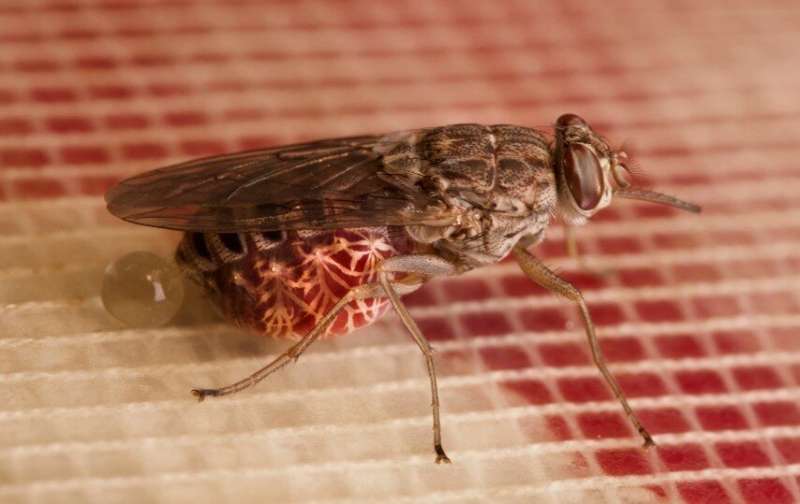A tsetse fly removing excess water from the bloodmeal. Credit: Daniel Hargrove, CC-BY 4.0, creativecommons.org/licenses/by/4.0/
African trypanosomiasis (also known as sleeping sickness) is a disease transmitted by tsetse flies and is fatal to humans and other animals; however, there is currently no vaccine, this disease is mainly controlled by reducing insect populations and patient treatment. A study published in the open access journal PLOS Biology by Alvaro Acosta-Serrano at Liverpool School of Tropical Medicine and an international team of researchers suggests that the approved drug nitisinone could be repurposed to kill tsetse flies without harming important pollinator insects.
Currently, the most effective method of controlling the transmission of African trypanosomiasis is by employing insecticide-based vector control campaigns (traps, targets, ground and cattle spraying) as all tsetse control methods are directed against the adult fly. However, in addition to killing tsetse flies, neurotoxic insecticides can harm the environment by contaminating water sources and reducing populations of key insect pollinator species. The orphan drug nitisinone is a drug approved for the safe treatment of two rare human genetic diseases, hereditary tyrosinemia type 1 and alkaptonuria, but has not previously been used to control insect populations. To evaluate its efficacy in killing tsetse flies, researchers allowed the flies to feed on rats that had been treated orally with nitisinone. After feeding on nitisinone-treated rats, 90% of tsetse flies died within 26 hours.
The researchers then investigated the drug's impact on captive bumblebees using nitisinone-treated sugar water as their hydration source. Nitisinone was not toxic to bumblebees, as the bees who ingested the drug had a mortality rate similar to the control group that only received a sugar source.
According to the authors, "Our results provide evidence that nitisinone could be used as an eco-friendly synergistic strategy alongside current tsetse control practices to control trypanosomiasis."
While nitisinone appears to be effective in reducing the transmission of African trypanosomiasis, mass administration of nitisinone to humans and livestock may be less effective for controlling tsetse flies in areas where wildlife are the primary reservoir and human bites account for less than 20% of the flies' bloodmeals. This limitation suggests that nitisinone will be most effectively implemented as part of an integrated vector control strategy. However, as nitisinone targets an essential digestive pathway in tsetse flies that is shared by all blood feeding insects, using this drug has the added benefit of killing other blood sucking arthropods like mosquitoes and ticks. Therefore, this drug could potentially be used as an environment-friendly, synergistic addition for controlling transmission of other vector-borne diseases alongside tsetse control campaigns.
Dr. Acosta-Serrano notes "This drug is ecologically friendly as it only affects blood feeding insects and not sugar feeders, like pollinators, which is different from other insecticides that can kill any insect. Although we still need to validate it in the field, our mathematical modelling shows that this drug could reduce the transmission of African trypanosomiasis in sub-Saharan Africa. We are currently testing its efficacy against other deadly insect vectors like mosquitoes".
More information: Sterkel M, Haines LR, Casas-Sánchez A, Owino Adung'a V, Vionette-Amaral RJ, Quek S, et al. (2021) Repurposing the orphan drug nitisinone to control the transmission of African trypanosomiasis. PLoS Biol 19(1): e3000796. doi.org/10.1371/journal.pbio.3000796
Journal information: PLoS Biology
Provided by Public Library of Science























